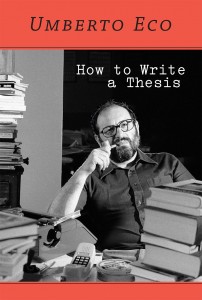Eco’s “How to Write a Thesis” in 15 Maxims
March 24th, 2015 by Christian(or, Thesis Advice, Click-Bait Style)
Italian semiotician and novelist Umberto Eco released How to Write a Thesis in 1977, well before his rise to international intellectual stardom. It has just been released in English for the first time by MIT Press. I’ve just read it.
I was thinking of assigning it in doctoral seminars, but I regret that a great deal of the book involves scholarly practices that are no longer relevant to anyone. For instance: Is it OK to insert an unnecessary footnote in the middle of your text so that your footnote numbering matches up correctly with what you’ve already typed? (Meaning: So you don’t have to re-type the entire manuscript. On a typewriter.)
It turns out that it is not OK to insert unnecessary footnotes.
And there’s a whole bunch of things about index card management, diacritical marks, and library union indices. And some stuff about the laurea.
However, even if I do not find the book relevant to assign as a whole, Eco’s great wit and strong opinions did lead me to compile the best quotes from the book. I present them to you here:
Eco’s 15 Maxims for PhD Students:
From How to Write a Thesis [1977/2015], selected by me. These are slightly paraphrased to make them work in a list. I hope you like them as much as I did.
- Academic humility is the knowledge that anyone can teach us something. Practice it.
- A thesis is like a chess game that requires a player to plan in advance all the moves he will make to checkmate his opponent.
- How long does it take to write a thesis? No longer than three years and no less than six months.
- Imagine that you have a week to take a 600-mile car trip. Even if you are on vacation, you will not leave your house and begin driving indiscriminately in a random direction. A provisional table of contents will function as your work plan.
- You must write a thesis that you are able to write.
- Your thesis exists to prove the hypothesis that you devised at the outset, not to show the breadth of your knowledge.
- What you should never do is quote from an indirect source pretending that you have read the original.
- Quote the object of your interpretive analysis with reasonable abundance.
- Use notes to pay your debts.
- You should not become so paranoid that you believe you have been plagiarized every time a professor or another student addresses a topic related to your thesis.
- If you read the great scientists or the great critics you will see that, with a few exceptions, they are quite clear and are not ashamed of explaining things well.
- You are not Proust. Do not write long sentences.
- The language of a thesis is a metalanguage, that is, a language that speaks of other languages. A psychiatrist who describes the mentally ill does not express himself in the manner of his patients.
- If you do not feel qualified, do not defend your thesis.
- Do not whine and be complex-ridden, because it is annoying.


March 30th, 2015 at 9:53 am
[…] Sandvig notes that Eco’s witty and direct advice is helpful in other ways, and he boils down Eco’s advice to 15 maxims. Go read. […]
April 13th, 2015 at 9:56 pm
[…] via http://blogs.law.harvard.edu/niftyc/archives/1024 […]